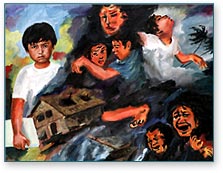 When Southeast Asian refugees first arrived, there was great interest in their mental and physical health. Governmental funding was available for research on this population, and as a result, an abundance of literature exists reporting on their early arrival. Less information has been gathered, however, on their long-term mental and physical health or other health-related matters. Access to culturally-sensitive health care practitioners, trained translators, health care insurance, and adequate transportation affect the refugees’ ability to seek health care. When Southeast Asian refugees first arrived, there was great interest in their mental and physical health. Governmental funding was available for research on this population, and as a result, an abundance of literature exists reporting on their early arrival. Less information has been gathered, however, on their long-term mental and physical health or other health-related matters. Access to culturally-sensitive health care practitioners, trained translators, health care insurance, and adequate transportation affect the refugees’ ability to seek health care.
The Effects of War
Refugees face major physical and mental health needs as a consequence
of their war experience and its aftermath. Physical maladies arising
from terrible experiences such as prolonged malnutrition and torture
afflict the refugees’ physical health. Mental traumas are also prevalent for some groups due to having witnessed horrific violence or the suffering of loved ones, but such problems are often left untreated. For example, Sudden Unexpected Nocturnal Death Syndrome, which causes “healthy” victims to die in their sleep with no medical explanation, has plagued Southeast Asian American men, especially the Hmong.
Mental Health
Mental health services have been provided to refugees on a sporadic basis, even though the need has been great. Cultural barriers are cited as preventing them from seeking or being open to counseling or therapy. Practitioners argue that if culturally and linguistically  appropriate services are available, however, Southeast Asian Americans will use them. Southeast Asian veterans and civilians alike face numerous ailments, including chronic post-traumatic stress disorder (PTSD), which is often untreated since refugees are not classified as veterans and provided services, unlike U.S. soldiers. appropriate services are available, however, Southeast Asian Americans will use them. Southeast Asian veterans and civilians alike face numerous ailments, including chronic post-traumatic stress disorder (PTSD), which is often untreated since refugees are not classified as veterans and provided services, unlike U.S. soldiers.
Most young children who arrived as unaccompanied minors (i.e., they arrived without their parents or supervising adults) suffered traumas and can have difficulty adjusting without treatment. Social problems such as domestic violence, child abuse, juvenile delinquency, severe depression, suicide, and addiction problems face the community and are compounded by the problems associated with the war and resettlement process. Bicultural and bilingual mental health services have been sporadic for these populations. They are sometimes provided only temporarily during a time of crisis for an ethnic community, such as when a rash of domestic violence or youth suicide occurs.
Continued on page 2 |
<< Back |
[1] 2 |
Next >> | |


 When Southeast Asian refugees first arrived, there was great interest in their mental and physical health. Governmental funding was available for research on this population, and as a result, an abundance of literature exists reporting on their early arrival. Less information has been gathered, however, on their long-term mental and physical health or other health-related matters. Access to culturally-sensitive health care practitioners, trained translators, health care insurance, and adequate transportation affect the refugees’ ability to seek health care.
When Southeast Asian refugees first arrived, there was great interest in their mental and physical health. Governmental funding was available for research on this population, and as a result, an abundance of literature exists reporting on their early arrival. Less information has been gathered, however, on their long-term mental and physical health or other health-related matters. Access to culturally-sensitive health care practitioners, trained translators, health care insurance, and adequate transportation affect the refugees’ ability to seek health care. 